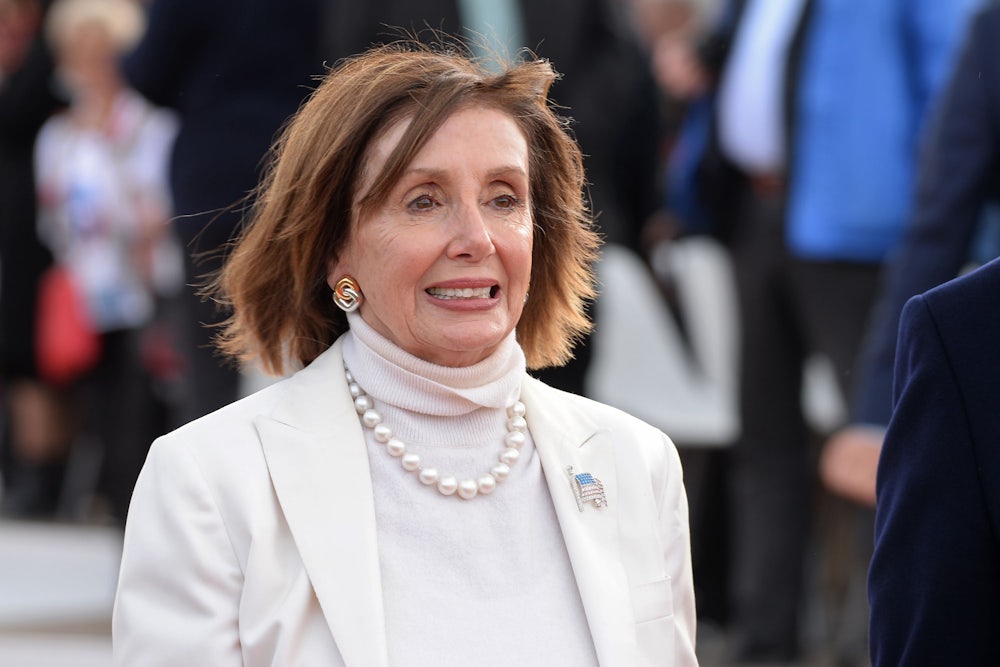Speaking in Normandy, where she’s leading a congressional delegation marking the 75th anniversary of D-Day, House Speaker Nancy Pelosi made it clear that she wouldn’t fight Donald Trump on the beaches. “I don’t talk about the president while I’m out of the country. That’s my principle,” she told reporters. (Trump, unsurprisingly, has no such code. He referred to Pelosi as “Nervous Nancy” and called her a “disaster” in an interview with Fox News shortly before a ceremony commemorating the Allied invasion.)
And, it appears Pelosi won’t be fighting Trump in Congress, either. Despite growing pressure from her caucus—now including members of party leadership, most notably Judiciary Committee chairman Jerry Nadler—Pelosi once again parried demands that House Democrats move forward with impeachment proceedings. “I don’t want to see him impeached, I want to see him in prison,” she said.
It’s a subtler argument than it seems. Pelosi is saying that what she wants, above all, is accountability. The House could impeach the president, but the Senate would ultimately acquit him. It’s better, in this formulation, to focus the Democratic Party’s energy on winning in 2020—kicking the president out of office and into the hands of federal prosecutors. Yes, that’s a harsher stance than her previous statements—“Lock him up” is certainly an escalation from “He’s just not worth it”—but that likely just reflects the sheer number of House Democrats who have come out in favor of impeachment following the Mueller report (now at sixty, and counting).
Perhaps more importantly, Pelosi’s words follow the Trump administration’s obstinate refusal to give an inch on the numerous investigations Congress is attempting to conduct. When Democrats reclaimed the House, most agreed on Pelosi’s strategy: Investigate first, impeach later—provided, of course, the investigations produce impeachable offenses. Now, however, it is becoming ever more clear that impeachment might be the only way to effectively investigate an administration that refuses to cooperate.
Pelosi is one of a dwindling number of Democrats who refuses to acknowledge this reality. But her line of reasoning doesn’t track—particularly now that she has stated that Trump should be jailed.
Pelosi is acknowledging that the president has committed prosecutable crimes. If he has (and he has!), then Democrats have a constitutional responsibility to begin impeachment proceedings. Robert Mueller has strongly hinted that, given the evidence of criminal wrongdoing he and his team uncovered, it is Congress’s job to hold the president accountable. Trump absolutely should face further consequences when he leaves office, but first, it’s on the House Democrats to start the accountability process the Constitution requires.
Pelosi has argued in the past that impeachment is a bad option for Democrats because it would be interpreted by the public as being politically motivated. But it is increasingly clear that it is Pelosi, and not pro-impeachment Democrats, who is playing politics. The Speaker justifies her refusal to officially open an impeachment inquiry—or, for that matter, to significantly ramp up pressure on the administration to cooperate with House investigators—by creating space for the tired, conventional wisdom that any hint of impeachment will galvanize Republicans and harm Democrats’ election chances in 2020.
As many have argued, there is simply no way to know that. If anything, impeachment would allow Democrats to make the case that the president has broken the law and that his administration is corrupt; focusing on these issues would almost certainly move public opinion from where it is now. (That point is actually one with historical evidence. In July 1973, public support for impeachment of President Richard Nixon was at 19 percent. By the time Nixon left office in August 1974, nearly 60 percent approved not only of impeachment, but of removing the president from office. Polling data from the period, moreover, suggests that something similar could happen today.)
Which leads us to another error—this one unforced. Pelosi believes that the Democrats currently hold a strong hand and that the president will be easily defeated in next year’s election. This is probably correct, given his consistently low approval ratings and the likelihood of an economic slowdown in the next eighteen months—but Trump’s defeat is far from a sure thing. We do not know what will happen between now and November 3, 2020; we don’t even know who the Democratic candidate will be! At the very least, it’s likely that the president will have at least as strong a chance of reelection as he did of being elected in 2016—about 30 percent.
Pelosi’s decision-making process is reminiscent of Obama’s moves during the closing months of the 2016 election. Then, administration officials were reluctant to make the case that the Russian government was aiding the Trump campaign, fearing that it would backfire and damage Hillary Clinton’s election prospects. They were guided, as many were, by the belief that Trump’s defeat was inevitable. (Mitch McConnell, it should be noted, played a pivotal role in that decision, warning Obama that he would politicize Russian interference if the president made it public.) That, of course, turned out to not be the case. In retrospect, the decision not to do more to publicize Russian interference was disastrous. Pelosi, gazing into her crystal ball, is making a similar calculation: Soon enough, Donald Trump will be someone else’s problem.
That may very well be true. But he’s Nancy Pelosi’s problem now.
